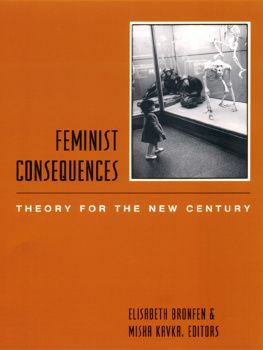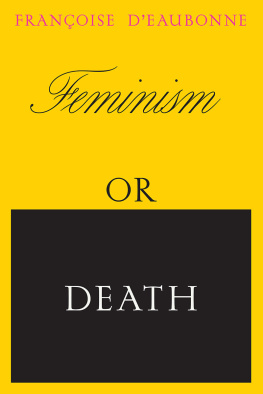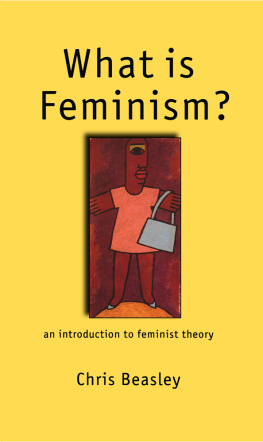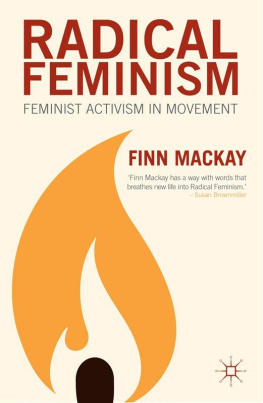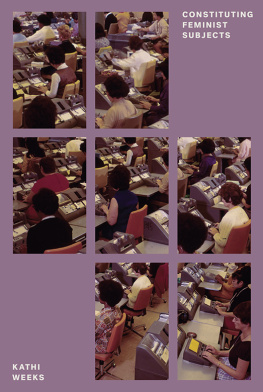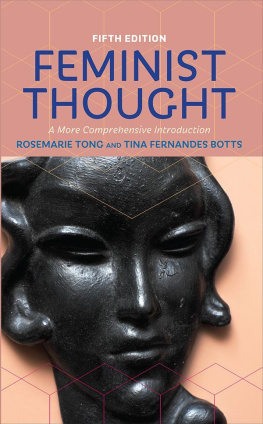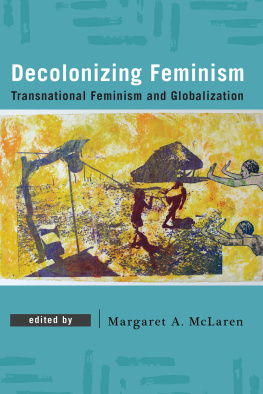
Feminist Consequences
GENDER AND CULTURE
CAROLYN G. HEILBRUN AND NANCY K. MILLER, EDITORS
GENDER AND CULTURE
A SERIES OF COLUMBIA UNIVERSITY PRESS
Edited by Carolyn G. Heilbrun and Nancy K. Miller
In Doras Case: Freud, Hysteria, Feminism
Edited by Charles Bernheimer and Claire Kahane
Breaking the Chain: Women, Theory, and French Realist Fiction
Naomi Schor
Between Men: English Literature and Male Homosocial Desire
Eve Kosofsky Sedgwick
Romantic Imprisonment: Women and Other Glorified Outcasts
Nina Auerbach
The Poetics of Gender
Edited by Nancy K. Miller
Reading Woman: Essays in Feminist Criticism
Mary Jacobus
Honey-Mad Women: Emancipatory Strategies in Womens Writing
Patricia Yaeger
Subject to Change: Reading Feminist Writing
Nancy K. Miller
Thinking Through the Body
Jane Gallop
Gender and the Politics of History
Joan Wallach Scott
The Dialogic and Difference: An/ Other Woman in Virginia Woolf and Christa Wolf
Anne Herrmann
Plotting Women: Gender and Representation in Mexico
Jean Franco
Inspiriting Influences: Tradition, Revision, and Afro-American Womens Novels
Michael Awkward
Hamlets Mother and Other Women
Carolyn G. Heilbrun
Rape and Representation
Edited by Lynn A. Higgins and Brenda R. Silver
Shifting Scenes: Interviews on Women, Writing, and Politics in Post-68 France
Edited by Alice A. Jardine and Anne M. Menke
Tender Geographies: Women and the Origins of the Novel in France
Joan DeJean
Modern Feminisms: Political, Literary, Cultural
Maggie Humm
Unbecoming Women: British Women Writers and the Novel of Development
Susan Fraiman
The Apparitional Lesbian: Female Homosexuality and Modern Culture
Terry Castle
George Sand and Idealism
Naomi Schor
Becoming a Heroine: Reading About Women in Novels
Rachel M. Brownstein
Nomadic Subjects: Embodiment and Sexual Difference in Contemporary Feminist Theory
Rosi Braidotti
Engaging with Irigaray: Feminist Philosophy and Modern European Thought
Edited by Carolyn Burke, Naomi Schor, and Margaret Whitford
A Certain Age: Reflecting on Menopause
Edited by Joanna Goldsworthy
Mothers in Law: Feminist Theory and the Legal Regulation of Motherhood
Edited by Martha Albertson Fineman and Isabelle Karpin
Critical Condition: Feminism at the Turn of the Century
Susan Gubar
GENDER AND CULTURE READERS
Modern Feminisms: Political, Literary, Cultural
Maggie Humm
Feminism and Sexuality: A Reader
Stevi Jackson and Sue Scott
Writing on the Body: Female Embodiment and Feminist Theory
Edited by Katie Conboy, Nadia Medina, and Sarah Stanbury
Feminist Consequences
THEORY FOR THE NEW CENTURY
EDITED BY
Elisabeth Bronfen and Misha Kavka

Columbia University Press New York
COLUMBIA UNIVERSITY PRESS
Publishers Since 1893
New York Chichester, West Sussex
Copyright 2001 Columbia University Press
All rights reserved
E-ISBN 978-0-231-53014-9
Library of Congress Cataloging-in-Publication Data
Feminist consequences : theory for the new century /
edited by Elisabeth Bronfen and Misha Kavka.
p. cm.(Gender and culture)
Includes bibliographical references and index.
ISBN 023111704-3 (cloth : alk. paper)
ISBN 023111705-1 (pbk : alk. paper)
1. Feminist theory. 2. Feminism.
I. Bronfen, Elisabeth. II. Kavka, Misha. III. Series.
HQ1190 .F444 2000
305.4201dc21 00060141
A Columbia University Press E-book.
CUP would be pleased to hear about your reading experience with this e-book at .
Designed by Audrey Smith
CONTENTS
Feminism aint what it used to be. Perhaps with some nostalgia, many of us who call ourselves feminists look back to the peak of the second wave in the 1970s, to a feminism that in retrospect seems to have had a clear object (women), a clear goal (to change the fact of womens subordination), and even a clear definition (political struggle against patriarchal oppression). Such clarity is a trick of memory, no doubt, which reflects more on the pluralized, diversified state of feminism at the turn of the new century than it does on the actual agreements among the theorists and practitioners of the second wave. Nonetheless, the feminist work of the long 1980s (read late 1970s to early 1990s), in refining from ever-proliferating positions the objects, goals, and definitions of feminism, has had the effect of splintering what had been a recognizable feminist project into unrecognizability, even into a paradoxical state of visible invisibility. It is as though the more that feminism has become a publicly visible term, the less sense both its practitioners and its detractors have of what it is about.
Clarity about the object, goal, and even definition of feminism now seems no longer possible or even desirable. What feminist consciousness-raising groups may once have considered the common object of feminismwomen who share certain common experiences by the fact of their sexhas been exposed as a normatizing concept that performs a range of exclusions at the levels of class, race, ethnicity, nationality, and sexuality. If the putative object of feminism has turned out to be a fantasy of commonality, then the notion of a singular goal was already problematized from the outset by a disagreement between those (Marxist and materialist feminists) who strove for radical equality, or the goal of ultimately erasing the social effects of sex difference, and those (radical American feminists as well as the French theorists of criture fminine) who strove for radical difference, or the goal of maintaining sex difference without social detriment. Inherent to this problem of a common goal is the larger battle between feminist praxis and feminist theory (itself a debatable division), which separates feminist activists who seek to improve the social/living conditions for women through modes of direct action and feminist theorists who seek to understand and affect the structural constraints on female subjectivity. Most important, the very terms through which we might now seek to define feminism have been refined, pluralized, displaced, and/or deconstructed to the point where they hardly seem available anymore, certainly not if one claims to be defining feminism on behalf of women. Which brings us to the paradox of being involved in a political practice that can no longer define itself as a practice, let alone define its goals.
So feminism aint what it used to be, and the prefix post begins to rear its ugly head. Postfeminism implies, first and foremost, that there was once a time when feminists could say we and that that time is now gone. This is surely no more than a fantasy of retrospection, but it nonetheless threatens to mark our words on the subject with the anger, grief, denial, or resignation of those mourning at a graveside. Allow me, in light of a common readership, to adopt a provisional we at least in terms of those readers interested enough in feminist consequences to be thumbing through this volume. Allow me further to define we as those readers/writers/thinkers/doers, engaged in different projects and struggles, who have invested and continue to invest in feminism as an enabling term. For how can feminism be dead, if the term continues to enable work built out of previous work? Its not as though we turned our backs on a coherent project and returned to it only in time to discover that the heartbeat was failing. On the contrary, the notion of a collective project with a singular history makes up both the nostalgized past and the utopian future of feminism, kept in suspense by a present that consists of multiple, ongoing kinds of feminist activity. The change marked by post thus happened while we were
Next page
